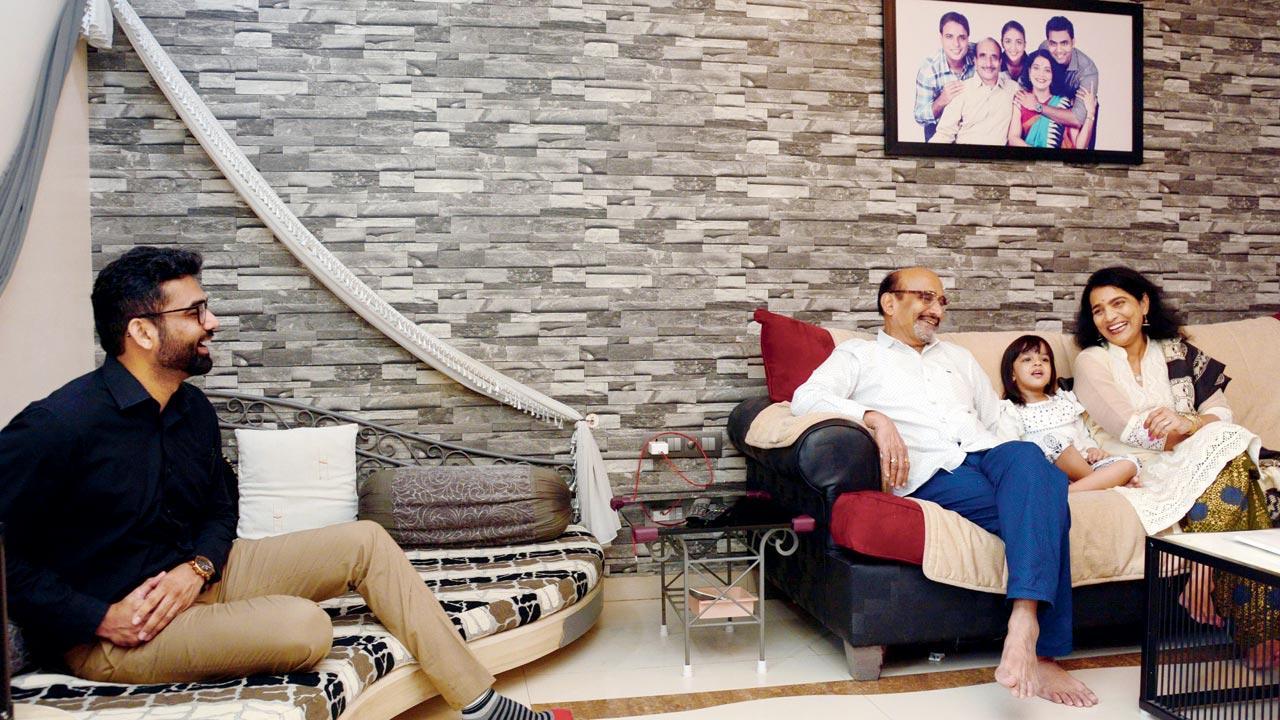What’s it like to live in a home where you’re the only one vaccinated? With the next phase of vaccination ready to kick off in March, members from the medical and essential services communities tell us what’s changed and hasn’t

Dr Amit Gawande, consultant pulmonologist, with parents, Purushottam and Surekha, and niece Samaira, at their Andheri home. Post taking the vaccine, Gawande says some domestic restrictions have eased. Pic/Satej Shinde
All through the pandemic, each time head constable Bhikaji Khadapkar, would leave for duty, his wife would say a small prayer: God, keep him safe from the virus. “His job involves law enforcement and crowd control, so it’s high-risk. Of course, he wears the mask, but that can’t guarantee foolproof protection,” she says. Two weeks ago, Khadapkar got his first vaccine jab against COVID-19. And, that he says has taken the weight off Snehal’s shoulders, although she’s not yet eligible for the vaccine and neither are their two children, both in their 20s. Her 75-year-old mother-in-law who lives with them is also yet to receive the vaccine. Registration for vaccination for those above 60 years kicks off on March 1.
ADVERTISEMENT
Currently, the city has 28 active vaccination centres in operation. “For now, I’m happy that at least one of us is in a safer place,” she says. Khadapkar is honest when he says that while taking the shot was mandatory for frontline workers like himself, he would’ve taken it even if the choice was left to him. Unlike many recipients who have experienced mild and moderate reactions, such as pain at the injection site, headache, high-grade fever, malaise and fatigue, Khadapkar says he’s come out of it relatively comfortably.
Bhikaji Khadpkar, head constable at Juhu Police station, with wife Snehal, daughter Mrunali and mother Anita at their Andheri home. He says he continues to be careful around family given that his mother is in her 70s and social distancing in a 260 sq ft home is impossible. Pic/Ashish Rane
Dr Amit Gawande is a Mumbai-based consultant pulmonologist and critical care specialist. He recently got his second vaccine shot, but that hasn’t translated into a carefree existence. “Getting vaccinated does not mean you cannot spread the infection. If you contract it, it may not be a severe one due to the protection the vaccine provides you, but you can still be a spreader. All healthcare professionals are aware of this fact and won’t let their guard down,” he thinks. Until November last year, Gawande was living with his family in Andheri West. He has presently shifted to a nearby apartment, but continues to visit his home every day. His parents are both in their late 60s, which puts them in the vulnerable category. “At the peak of the pandemic, I would do the rounds of COVID-19 hospitals, so I had to be very careful. I would not get my bags and equipment into the house; I’d leave them in the car. I’d wash my clothes separately. A sanitiser was kept in all rooms. No shoes were allowed beyond the threshold of the door,” he remembers. In the last one year, Dr Gawande has dined at restaurants only thrice. And this hasn’t changed even after taking the vaccine.
“I still prefer to hang indoors. Certain domestic protocols have been eased such as washing clothes separately, because now I don’t visit COVID-19 hospitals.” Having a separate bedroom, allows Gawande to socially distance if the need arises. But, for the Khadapkars, who live in a 260 sq ft SRA flat in Andheri East, it was out of question. “Social distancing in a domestic setting was never an option for us. I’m still very careful and take precautions when I step inside the house. So, it’s not entirely normal. Not yet,” the policeman says, fully aware of the repeat threat that stares at Mumbai, with Maharashtra Chief Minister Uddhav Thackeray addressing the state last weekend to warn of a second lockdown if people failed to comply with the COVID-19 guidelines.
Manjula Dinesh Anjara, a health worker with the BMC B-ward, is 55 years old and lives with her husband, son and daughter-in-law. She is currently the only vaccinated person in the family. “I ended up with COVID-19 last year when I started going door-to-door to take swab tests and run COVID-19 checks. It feels good to have been vaccinated; I feel protected but not 100 per cent because we are still dealing with people who are not cautious.” Wearing a mask in public, the frequent washing and
sanitising of hands and heading straight to the bathroom on reaching home, are rituals that she continues to follow to this day.
Khadapkar agrees that the casual attitude of citizens gets to him. He was recently in Delhi and Bihar on official duty, and was surprised to find that hardly anybody was wearing face masks. “Funnily, I still feel a lot safer in Mumbai.”
29,884
Total number of healthcare and frontline workers who’ve been given second jab
21,124
Total number of policemen vaccined in Mumbai so far
 Subscribe today by clicking the link and stay updated with the latest news!" Click here!
Subscribe today by clicking the link and stay updated with the latest news!" Click here!






